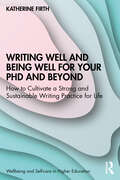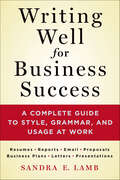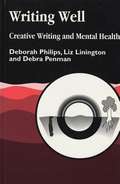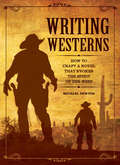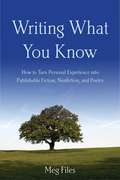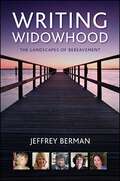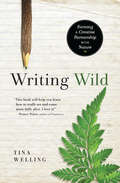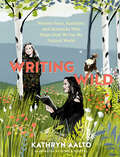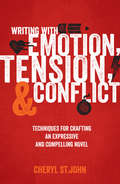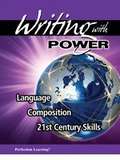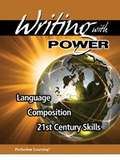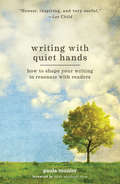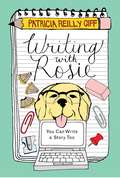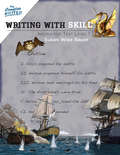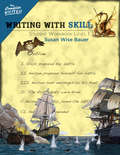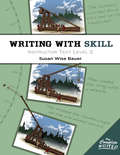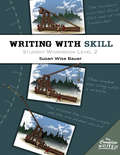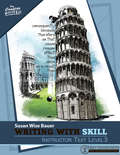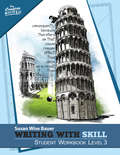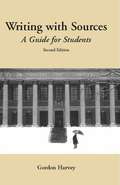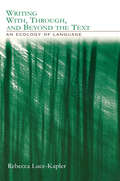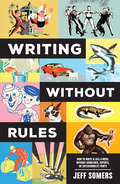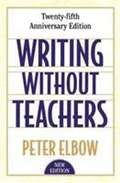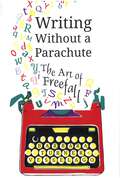- Table View
- List View
Writing Well and Being Well for Your PhD and Beyond: How to Cultivate a Strong and Sustainable Writing Practice for Life (Wellbeing and Self-care in Higher Education)
by Katherine FirthPrioritizing wellbeing alongside academic development, this book provides practical advice to help students write well, and be well, during their PhD and throughout their career. In this unique book, Katherine Firth offers expert guidance on developing a writing practice and avoiding burnout, providing strategies and insights for developing a sustainable writing career beyond the PhD thesis. The book covers every stage of the academic writing process, from planning and researching, through getting words on the page, to the often unexpectedly time-consuming editing and polishing. Readers are reminded that writing a thesis is hard work, but it needn’t be damaging work. Each chapter includes a toolbox of strategies and techniques, such as meditations, writing exercises and tips to maintain physical wellbeing, that will help doctoral candidates start writing and keep writing, without sacrificing their health, wellbeing or relationships. Relevant at any stage of the writing process, this book will help doctoral students and early career researchers to produce great words that people want to read, examiners want to pass and editors want to publish.
Writing Well for Business Success: A Complete Guide to Style, Grammar, and Usage at Work
by Sandra E. LambSo much of success in business depends on writing well. From résumés to reports, proposals to presentations,Writing Well for Business Success will help you communicate your ideas clearly, quickly and effectively.It will help you: -Distill your message into a well-targeted statement-Ace the elements of style-Write what you want to say in emails, business plans and more-Master the tricks of editing yourselfPresented in author Sandra Lambs lighthearted and easy accessible style, this little book is an essential desk reference guide for the modern working world.
Writing Well: Creative Writing and Mental Health
by Deborah Philips Liz Linington Debra PenmanThis is a book for those who are professionally working with people learning to write, and is intended for creative writing groups in which the practice of writing is primarily for its therapeutic benefits, rather than for the production of elegant poetry and prose. This handbook has grown out of our own experiences in work with psychiatric patients in a range of different institutions, and although it is not restricted to use in a mental health context, it has been designed with that specifically in mind.
Writing Westerns: How to Craft Novels that Evoke the Spirit of the West
by Michael NewtonCraft a novel that evokes the spirit of the West Western Movies don't appear as frequently today as they did in the 1960s, but those that make the cut in Hollywood prompt frequent Oscar buzz. Nor have Western novels been eclipsed. In 2010, Amazon. com offered 213 new Western novels for sale, plus many reprints of older classics. Writing Westerns examines what a Western is, while teaching you how to research and write one. You'll benefit from the author's experience#151;248 books published since 1977#151;and the example of masters in the field, from Zane Grey and Max Brand to Louis L'Amour and Cormac McCarthy. Each chapter includes a short list of recommended sources for further reading. Appendices to the main text include a glossary of Old West slang and jargon, which is helpful in writing realistic dialogue, a timeline of significant historical events, and a list of classic Western films and novels. Research, talent, and imagination are the keys to writing a successful novel. Join us now, as we set off into the West.
Writing What You Know: How to Turn Personal Experiences into Publishable Fiction, Nonfiction, and Poetry
by Meg FilesIt's easy for people to write about their feelings in a journal. It's more difficult, however, to convert personal experiences into stories worthy of publication-fiction, non-fiction, or poetry. Filled with engaging exercises, Write from Life guides writers in identifying story-worthy material and transforming their raw material into finished pieces, through conquering fears associated with personal exposure, determining a story's focus, shaping the material into a cohesive whole, and editing and revising as needed. Writers working in any form will find this book invaluable for supplying them with the inspiration and practical instruction they need to get their experiences and emotions into print. In addition, they will learn to:Tap into difficult, guarded parts of their lives to tell the stories they desireWrite emotionally intense materialDecide which literary form is right for their storiesCreate the illusion of real speech with effective dialogueTell their stories with authorityDevelop effective beginnings, middles, and endsShare their work with others and deal with reactions courageouslyFiles' friendly, encouraging advice makes it a pleasure for writers to write the stories they are most passionate about. In an age when publishing can mean pushing a button on Facebook, Twitter, or a blog, there is an enduring urge to send stories out into the world. In an atmosphere of misinformation and lies that social media and the ease of publishing may encourage, we especially crave truth. The time to start telling it is now-so many aspiring writers have truths worth sharing and stories begging to be told!Allworth Press, an imprint of Skyhorse Publishing, publishes a broad range of books on the visual and performing arts, with emphasis on the business of art. Our titles cover subjects such as graphic design, theater, branding, fine art, photography, interior design, writing, acting, film, how to start careers, business and legal forms, business practices, and more. While we don't aspire to publish a New York Times bestseller or a national bestseller, we are deeply committed to quality books that help creative professionals succeed and thrive. We often publish in areas overlooked by other publishers and welcome the author whose expertise can help our audience of readers.
Writing Widowhood: The Landscapes of Bereavement
by Jeffrey BermanThe death of a beloved spouse after a lifetime of companionship is a life-changing experience. To help understand the reality of bereavement, Jeffrey Berman focuses on five extraordinary American writers—Joan Didion, Sandra Gilbert, Gail Godwin, Kay Redfield Jamison, and Joyce Carol Oates—each of whom has written a memoir of spousal loss. In each chapter, Berman gives an overview of the writer's life and art before widowhood, including her early preoccupation with death, and then discusses the writer's memoir and her life as a widow. He discovers that writing was, for all of these authors, both a solace and a lifeline, enabling them to maintain bonds with their lost loved ones while simultaneously moving on with their lives. These memoirs of widowhood, Berman maintains, reveal not only courage and resilience in the face of loss, but also the critical role of writing and reading in bereavement and recovery.
Writing Wild: Forming a Creative Partnership with Nature
by Tina WellingAlign Your Creative Energy with Nature’s “Everything we know about creating,” writes Tina Welling, “we know intuitively from the natural world.” In Writing Wild, Welling details a three-step “Spirit Walk” process for inviting nature to enliven and inspire our creativity.
Writing Wild: Women Poets, Ramblers, and Mavericks Who Shape How We See the Natural World
by Kathryn Aalto&“An exciting, expert, and invaluable group portrait of seminal women writers enriching a genre crucial to our future.&” —Booklist In Writing Wild, Kathryn Aalto celebrates 25 women whose influential writing helps deepen our connection to and understanding of the natural world. These inspiring wordsmiths are scholars, spiritual seekers, conservationists, scientists, novelists, and explorers. They defy easy categorization, yet they all share a bold authenticity that makes their work both distinct and universal. Featured writers include: Dorothy Wordsworth, Susan Fenimore Cooper, Gene Stratton-Porter, Mary Austin, and Vita Sackville-WestNan Shepherd, Rachel Carson, Mary Oliver, Carolyn Merchant, and Annie DillardGretel Ehrlich, Leslie Marmon Silko, Diane Ackerman, Robin Wall Kimmerer, and Lauret SavoyRebecca Solnit, Kathleen Jamie, Carolyn Finney, Helen Macdonald, and Saci LloydAndrea Wulf, Camille T. Dungy, Elena Passarello, Amy Liptrot, and Elizabeth Rush Part travel essay, literary biography, and cultural history, Writing Wild ventures into the landscapes and lives of extraordinary writers and encourages a new generation of women to pick up their pens, head outdoors, and start writing wild.
Writing With Emotion, Tension, and Conflict: Techniques for Crafting an Expressive and Compelling Novel
by Cheryl St. JohnToday's highly competitive fiction market requires writers to imbue their novels with that special something - an element that captures readers' hearts and minds. In Writing With Emotion, Tension & Conflict, writers will learn vital techniques for writing emotion into their characters, plots and dialogue in order to instill that special something into every page.
Writing With Power, Grade 7
by PLC Editors StaffWriting With Power has chapters that will answer students questions and lay the foundation for the writing instruction and activities presented in future chapters.
Writing With Power, Grade 9
by Peter Smagorinsky Joyce Senn Constance WeaverLanguage Arts Textbook Grade 9
Writing With Quiet Hands: How to Shape Your Writing to Resonate with Readers
by Paula MunierCommit to Your Writing Craft!To write with quiet hands is to embrace the journey all writers must take: from seeking inspiration and shaping raw material to cultivating a personal support network, navigating the various pathways to publication, and committing to a lifelong practice. In Writing with Quiet Hands, author and literary agent Paula Munier helps you hone your words into well-crafted stories and balance this satisfying work with the realities and challenges of the publishing world.You'll learn how to tame your muse, manage your time wisely, and treat your practice with the seriousness it deserves. You'll develop a distinct voice, write with style and substance, employ the tenets of strong structure, and engage your readers by injecting narrative thrust into your stories. You'll explore the finer aspects of craft, refine your work, and boldly bridge the gap between published and unpublished. From drafting and revising to querying agents, you'll discover the secrets to writing artfully, and publishing bravely.Fulfilling and rewarding writing careers are forged from the successful marriage of craft and business know-how. Are you ready to embark on your journey, armed with both grace and grit? Are you ready to write with quiet hands?"Writing with Quiet Hands is loaded tips and tools, firsthand experience, and down-to-earth advice from a writer, editor, and agent who's seen it from all sides. Paula Munier gives it to you straight as she dissects the inspiration, perspiration, and dogged determination it takes to set and meet your writing goals. This book will keep you sane." --Hallie Ephron, New York Times best-selling author of Night Night, Sleep Tight
Writing With Rosie: You Can Write a Story Too
by Patricia Reilly GiffIn a humorous and entertaining guide, two-time Newbery Honor-winning author Patricia Reilly Giff breaks down the process of writing fiction into steps, all while trying to cope with the constant distractions from her exuberant seventy-pound golden retriever puppy, Rosie. Citing examples from her award-winning novels she explains how to proceed with each step in chapter sections titled "Can You See What I Did?" Young writers can find the inspiration and tips they need to try their hand in sections called "Your Turn. " Anecdotes from her writing life and hilarious adventures with her high-energy pet provide entertainment and encouragement.
Writing With Skill, Level 1: Instructor Text (The Complete Writer)
by Susan Wise BauerTraditional principles. Contemporary methods. Unparalleled results. This groundbreaking new writing series combines time-tested classical techniques--the imitation and analysis of great writers--with original composition exercises in history, science, biography, and literature. Skills Taught: * One- and two-level outlining * Writing chronological narratives, biographical sketches, descriptions, and sequences across the curriculum * Constructing basic literary essays on fiction and poetry * Researching and documenting source material * First volume of four that will prepare students for high-level rhetoric and composition Features of the program: * Writing assignments are modeled on examples from great literature and classic nonfiction * All source material for assignments is provided--no other books are needed * This Instructor Text provides scripted dialogue to use when the student has difficulty, plus detailed guidance on how to evaluate the student's work * Student Workbook (sold separately) encourages independence by directing all assignments to the student * First volume of four that will prepare students for high-level rhetoric and composition
Writing With Skill, Level 1: Student Workbook (The Complete Writer)
by Susan Wise BauerTraditional principles. Contemporary methods. Unparalleled results. This groundbreaking new writing series combines time-tested classical techniques--the imitation and analysis of great writers--with original composition exercises in history, science, biography, and literature. Skills Taught: * One- and two-level outlining * Writing chronological narratives, biographical sketches, descriptions, and sequences across the curriculum * Constructing basic literary essays on fiction and poetry * Researching and documenting source material * First volume of four that will prepare students for high-level rhetoric and composition Features of the program: * Writing assignments are modeled on examples from great literature and classic nonfiction * All source material for assignments is provided--no other books are needed * This Student Workbook encourages independence by directing all assignments to the student * Instructor Text (sold separately) provides scripted dialogue to use when the student has difficulty, plus detailed guidance on how to evaluate the student's work * First volume of four that will prepare students for high-level rhetoric and composition
Writing With Skill, Level 2: Instructor Text (The Complete Writer)
by Susan Wise BauerTime-tested classical techniques--the imitation and analysis of great writers--combined with original composition exercises in history, science, biography, and literature. The Student Workbook encourages independent composition, while the Instructor Text contains easy-to-use supporting information for the teacher, rubrics for grading, sample compositions, and dialogue to use while teaching. Together, the Student Workbook and Instructor Text provide a full year of middle-grade writing instruction, preparing students to enter high-level rhetoric. Reviews Level One skills in narration, biographical sketches, descriptions, and sequences Teaches new skills in writing comparisons, drawing contrasts, and tracing cause and effect Improves sentence style through prose exercises drawn from Erasmus, Aristotle, and other classical rhetoricians Covers three-level outlining, composition planning and structure Guides the student through critical essay writing in both fiction and poetry Provides practice in research and documentation skills
Writing With Skill, Level 2: Student Workbook (The Complete Writer) (The Complete Writer #0)
by Susan Wise BauerTime-tested classical techniques--the imitation and analysis of great writers--combined with original composition exercises in history, science, biography, and literature The Student Workbook encourages independent composition, while the Instructor Text contains easy-to-use supporting information for the teacher, rubrics for grading, sample compositions, and dialogue to use while teaching. Together, the Student Workbook and Instructor Text provide a full year of middle-grade writing instruction, preparing students to enter high-level rhetoric. Skills Taught: One- and two-level outlining Writing chronological narratives, biographical sketches, descriptions, and sequences across the curriculum Constructing basic literary essays on fiction and poetry Researching and documenting source material First volume of four that will prepare students for high-level rhetoric and composition Features of the program: Writing assignments are modeled on examples from great literature and classic nonfiction All source material for assignments is provided--no other books are needed This Student Workbook encourages independence by directing all assignments to the student Instructor Text (sold separately) provides scripted dialogue to use when the student has difficulty, plus detailed guidance on how to evaluate the student's work Second volume of four that will prepare students for high-level rhetoric and composition
Writing With Skill, Level 3: Instructor Text (Vol. 3) (The Complete Writer)
by Susan Wise BauerThe third volume of the groundbreaking writing series that prepares students for high-level work in rhetoric and composition. Full support for parents and teachers, including rubrics, model compositions, teaching tips, and suggested dialogue. Building on the first two levels of Writing With Skill, Level 3 reinforces skills in original composition and introduces new skills in researching, organizing, and writing expository essays. This third level is marked by a focus on writing about cause and effect, as well as more advanced instruction in literary criticism, science writing, descriptions, and paragraph construction. Time-tested classical techniques--the imitation and analysis of great writers--combine with original composition exercises in history, science, biography, and literature. Along with the Student Workbook, this Level Three Instructor Text provides a complete year of advanced middle-grade writing instruction.
Writing With Skill, Level 3: Student Workbook (The Complete Writer)
by Susan Wise BauerThis third volume of the groundbreaking writing series prepares students for advanced work in rhetoric and composition. Straightforward, detailed instructions lead students through brainstorming, researching, and constructing original compositions. Building on the first two levels of Writing With Skill, Level 3 reinforces skills in original composition and introduces new skills in researching, organizing, and writing expository essays. Models from great writers provide inspiration; assignments in history, science, biography and literature expand the student's horizons. This third level is marked by a focus on writing about cause and effect, as well as more advanced instruction in literary criticism, science writing, descriptions, and paragraph construction. Time-tested classical techniques--the imitation and analysis of great writers--combine with original essay assignments. Along with the accompanying Instructor Guide, this Level Three Student Workbook provides a complete year of advanced middle-grade writing instruction.
Writing With Sources: A Guide For Students 2nd Edition
by Gordon HarveyDeveloped for Harvard University's Expository Writing Program, Writing with Sources describes the main principles and methods of integrating and citing sources in scholarly work, and provides cogent guidance on avoiding the misuse of sources. The second edition of Writing with Sources is updated throughout, and includes new material on the roles sources play in argument, on assessing the reliability of sources, and on attitudes about writing that can lead to plagiarism.
Writing With, Through, and Beyond the Text: An Ecology of Language
by Rebecca Luce-KaplerWriting With, Through, and Beyond the Text: An Ecology of Language elaborates an understanding of writing, its influences on our interpretations of experience and identity, and its potential for enabling individuals to learn about and connect to the world beyond themselves. Rather than considering writing a process, the author describes it as a system, an ecology that engages the individual in a variety of socially constituted and interacting systems. The book examines the pedagogical and curricular implications of this approach to writing, considering what it means to write and teach writing in ways that understand and acknowledge the ecological character of writing. This is an illuminating text for a wide audience of faculty, professionals, and graduate students in English, writing, education, and women's studies/feminist theory.
Writing Without Formulas
by William H. ThelinWriting Without Formulas shows students how to write instead of telling them. The first part focuses students on purposes for writing, critical analysis, audience awareness, organization of ideas, and language usage. In Part II, students learn about brainstorming and other activities associated with the writing process, investigate the best strategies for effective reading, see practical approaches to collaboration, and develop strategies for finding and using outside resources.
Writing Without Rules: How to Write & Sell a Novel Without Guidelines, Experts, or (Occasionally) Pants
by Jeffrey SomersStop What You're Doing and Write! Yes, You; Write! Most writing guides imply--or outright state--that there's a fixed, specific formula or list of rules you must follow to achieve writing and publishing success. And all of them are phonies. Well, not completely. There are real, applicable techniques and strategies in any writing reference to help you. But the idea that there's only one way of writing? Nuts! With unconventional approaches to the craft, fresh angles on novel writing and selling, a healthy dose of humor, and no promise of refunds, Writing Without Rules is for those writers who have tried and tried again--and are ready to success on their own terms. In these pages, accomplished author Jeff Somers will show you:The key to a successful writing career is doing the actual writing, no matter the circumstances.Fantastic ideas are available everywhere--you just need to know how to tap into sources through a variety of approaches.Important craft aspects that you should focus on, such as characters and dialogue, while spending less time on others, like setting.Effective ways to get published--whether it's traditional or self-publishing--and how to supplement your income.Whether you're a plotter, a pantser, or somewhere in-between, Writing Without Rules is for those writers who are looking for a fresh take on tackling the challenge of writing and selling a novel, and building a career. As Somers will show you, it's less about being perfect in everything, and more about having the confidence to complete everything.
Writing Without Teachers, 2nd Edition
by Peter ElbowIn Writing Without Teachers, well-known advocate of innovative teaching methods Peter Elbow outlines a practical program for learning how to write. His approach is especially helpful to people who get "stuck" or blocked in their writing, and is equally useful for writing fiction, poetry, and essays, as well as reports, lectures, and memos. The core of Elbow's thinking is a challenge against traditional writing methods. Instead of editing and outlining material in the initial steps of the writing process, Elbow celebrates non-stop or free uncensored writing, without editorial checkpoints first, followed much later by the editorial process. This approach turns the focus towards encouraging ways of developing confidence and inspiration through free writing, multiple drafts, diaries, and notes. Elbow guides the reader through his metaphor of writing as "cooking:" his term for heating up the creative process where the subconscious bubbles up to the surface and the writing gets good. 1998 marks the twenty-fifth anniversary of Writing Without Teachers. In this edition, Elbow reexamines his program and the subsequent influence his techniques have had on writers, students, and teachers. This invaluable guide will benefit anyone, whether in the classroom, boardroom, or livingroom, who has ever had trouble writing.
Writing Without a Parachute: The Art of Freefall
by Barbara Turner-VesselagoWriting Without a Parachute: The Art of Freefall shows both beginning and experienced writers how to get the thinking mind to step aside, so that writing becomes truly creative - a vulnerable and open-hearted engagement with the moment. Here for the first time, writing teacher Barbara Turner-Vesselago shares in print the method by which, for almost 30 years, she has helped hundreds of writers to publish fiction, memoir, non-fiction and poetry worldwide. By means of five simple precepts, she leads the writer step by step into real trust in writing through the art of Freefall: invoking the courage to fall without a parachute into the words as they come. This book can be used for inspiration, as a reference, or as a sustained, twelve-month course in writing. It will help all writers to connect with their deepest intention in writing, and to write with greater authority and grace.
